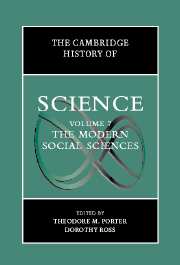Book contents
- Frontmatter
- 1 Introduction: Writing the History of Social Science
- PART I SCIENCES OF THE SOCIAL TO THE LATE NINETEENTH CENTURY
- PART II THE DISCIPLINES IN WESTERN EUROPE AND NORTH AMERICA SINCE ABOUT 1880
- PART III THE INTERNATIONALIZATION OF THE SOCIAL SCIENCES
- PART IV SOCIAL SCIENCE AS DISCOURSE AND PRACTICE IN PUBLIC AND PRIVATE LIFE
- 30 The Uses of the Social Sciences
- 31 Managing the Economy
- 32 Management and Accounting
- 33 Polling in Politics and Industry
- 34 Social Science and Social Planning During the Twentieth Century
- 35 Social Welfare
- 36 Education
- 37 The Culture of Intelligence
- 38 Psychologism and the Child
- 39 Psychiatry
- 40 Gender
- 41 Race and The Social Sciences
- 42 Cultural Relativism
- 43 Modernization
- Index
- References
32 - Management and Accounting
from PART IV - SOCIAL SCIENCE AS DISCOURSE AND PRACTICE IN PUBLIC AND PRIVATE LIFE
Published online by Cambridge University Press: 28 March 2008
- Frontmatter
- 1 Introduction: Writing the History of Social Science
- PART I SCIENCES OF THE SOCIAL TO THE LATE NINETEENTH CENTURY
- PART II THE DISCIPLINES IN WESTERN EUROPE AND NORTH AMERICA SINCE ABOUT 1880
- PART III THE INTERNATIONALIZATION OF THE SOCIAL SCIENCES
- PART IV SOCIAL SCIENCE AS DISCOURSE AND PRACTICE IN PUBLIC AND PRIVATE LIFE
- 30 The Uses of the Social Sciences
- 31 Managing the Economy
- 32 Management and Accounting
- 33 Polling in Politics and Industry
- 34 Social Science and Social Planning During the Twentieth Century
- 35 Social Welfare
- 36 Education
- 37 The Culture of Intelligence
- 38 Psychologism and the Child
- 39 Psychiatry
- 40 Gender
- 41 Race and The Social Sciences
- 42 Cultural Relativism
- 43 Modernization
- Index
- References
Summary
Accounting is one of the most influential forms of quantification of the late twentieth century. It creates the apparently objective financial flows to which certain Western societies accord such significance, and it makes possible distinctive ways of administering and coordinating processes and people. For a vast range of occupations, from shop floor workers and divisional managers to doctors and teachers, the calculative practices of accounting seek to affect behavior and to constrain actions in a manner and to an extent unimagined a century ago. Yet accounting is also one of the most neglected and least visible of all the quantifying disciplines. While the concepts and practices of the economist, the statistician, and the actuary have received detailed academic scrutiny, those of the accountant have been left in the shadows or relegated to a subsidiary role within a larger story. Only recently has this begun to change.
When accounting does become the object of public scrutiny, this typically concerns the external face of accounting, the reporting of the financial condition of business enterprises to shareholders and other outside parties, and the auditing of such reports. But accounting also has a “hidden” dimension: the financial monitoring, reporting, and evaluating that takes place inside an organization, and is typically treated as confidential even within the firm. This aspect, called management or cost accounting, is made up of practices such as budgeting, costing, and investment evaluation. It is the focus of the present chapter.
- Type
- Chapter
- Information
- The Cambridge History of Science , pp. 565 - 576Publisher: Cambridge University PressPrint publication year: 2003
References
- 2
- Cited by

